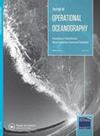Modification of a linear regression-based multi-model super-ensemble technique and its application in forecasting of wave height during extreme weather conditions
IF 2.4
3区 地球科学
Q4 METEOROLOGY & ATMOSPHERIC SCIENCES
引用次数: 5
Abstract
ABSTRACT In this study, we focus on the improvement of wave forecast of the Indian coastal region using a multi-model ensemble technique. Generally, a number of wave forecast are available for the same region from different wave models. The main objective of this study is to merge the wave forecasts available at Indian National Centre for Ocean Information Services from different wave models to obtain an improved wave forecast using a multi-model super-ensemble method [Krishnamurti et al. 1999. Improved weather and seasonal climate forecasts from multi-model super-ensemble. Science. 285:1548–1550] during extreme weather conditions and to modify Krishnamurthy’s techniques and validate with observations for a better prediction. Here, Multi-grid WAVEWATCH III, Simulating WAves Nearshore and MIKE 21 Spectral Waves are used for the generation of wave forecast. We propose a modification of Krishnamurthy’s linear regression-based ensemble model. By using both of these ensemble techniques, we perform a multi-model ensemble forecasting of significant wave height up to 24-h lead time in the Indian Ocean for three different cyclones (Nilofar, Hudhud and Phailin) and during the southwest monsoon. A comparison of ensemble predictions and individual model predictions with the actual observations showed generally satisfactory performance of the chosen tools. At the time of severe cyclones such as Hudhud and Phailin, our modified technique shows significantly better prediction than the linear regression-based ensemble technique.基于线性回归的多模式超集合技术的改进及其在极端天气波高预报中的应用
本文主要研究了多模式集合技术对印度沿海地区海浪预报的改进。一般来说,在同一区域,不同的波浪模式可以提供多种波浪预报。本研究的主要目的是合并印度国家海洋信息服务中心提供的来自不同波浪模式的海浪预报,以使用多模式超级集合方法获得改进的海浪预报[Krishnamurti等,1999]。从多模式超级集合改进天气和季节气候预报。科学,285:1548-1550]在极端天气条件下,修改Krishnamurthy的技术,并通过观察来验证更好的预测。本文采用多网格WAVEWATCH III、近岸模拟波和MIKE 21谱波进行波浪预报。本文提出了对Krishnamurthy基于线性回归的集合模型的一种修正。通过使用这两种集合技术,我们对印度洋三个不同气旋(Nilofar, Hudhud和Phailin)和西南季风期间的显著波高进行了多模式集合预报,预报时间长达24小时。集合预测和单个模型预测与实际观测结果的比较表明,所选工具的性能总体上令人满意。在强气旋如“哈德哈德”和“菲林”时,我们的改进技术的预测效果明显优于基于线性回归的集合技术。
本文章由计算机程序翻译,如有差异,请以英文原文为准。
求助全文
约1分钟内获得全文
求助全文
来源期刊
CiteScore
7.50
自引率
9.70%
发文量
8
审稿时长
>12 weeks
期刊介绍:
The Journal of Operational Oceanography will publish papers which examine the role of oceanography in contributing to the fields of: Numerical Weather Prediction; Development of Climatologies; Implications of Ocean Change; Ocean and Climate Forecasting; Ocean Observing Technologies; Eutrophication; Climate Assessment; Shoreline Change; Marine and Sea State Prediction; Model Development and Validation; Coastal Flooding; Reducing Public Health Risks; Short-Range Ocean Forecasting; Forces on Structures; Ocean Policy; Protecting and Restoring Ecosystem health; Controlling and Mitigating Natural Hazards; Safe and Efficient Marine Operations

 求助内容:
求助内容: 应助结果提醒方式:
应助结果提醒方式:


